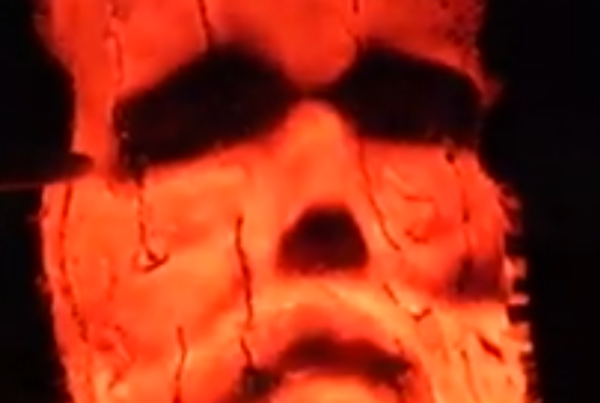I have ever championed the view that the hallmark of good history or philosophy, especially for young scholars, is for a scholar to take what might be considered as a small problem or topic, perhaps one typically overpassed by others (e.g., Jefferson and guns), and do a thorough job of it. In that way, whoever wishes to write on that problem will have to go through that scholar’s work.
That is essentially what I propose to do in this essay: to take an especially problematic passage by Jefferson at the end of Query XVII of his Notes on the State of Virginia—the query titled “Religion”—and subject it to critical analysis in some effort to provide clarity.
What makes this passage such a “knotty nodus”?
First, it is written with a soured quill—more indicative of something John Adams might have written than of something Jefferson wrote. Jefferson is typically optimistic in writings—sometimes unreasonably optimistic to such an extent that many scholars categorize him as a quixotic, ungrounded idealist.
Second, the passage is an aside. Query XVII of Notes on Virginia is Jefferson’s most sustained investigative discussion of the benefits of freedom of religion. He offers in a machine-gun-like manner numerous arguments for freedom of religion. After mentioning how Pennsylvania and New York have thrived without state sanction of any one religion, he turns strangely to a critical discussion of popular government. I include the passage in toto:
But is the spirit of the people an infallible, a permanent reliance? Is it government? Is this the kind of protection we receive in return for the rights we give up? Besides, the spirit of the times may alter, will alter. Our rulers will become corrupt, our people careless. A single zealot may commence persecutor, and better men be his victims. It can never be too often repeated, that the time for fixing every essential right on a legal basis is while our rulers are honest, and ourselves united. From the conclusion of this war we shall be going down hill. It will not then be necessary to resort every moment to the people for support. They will be forgotten therefore, and their rights disregarded. They will forget themselves, but in the sole faculty of making money, and will never think of uniting to effect a due respect for their rights. The shackles, therefore, which shall not be knocked off at the conclusion of this war, will remain on us long, will be made heavier and heavier, till our rights shall revive or expire in a convulsion.
What does Jefferson mean by the “spirit of the people”?
Jefferson comes clean in a letter to John Taylor (28 May 1816) in which he defines republicanism as government by the people. He says that “republic” refers to
a government by its citizens in mass, acting directly and personally, according to the rules established by the majority.
Jefferson then adds a more-or-less qualification:
Governments are more or less republican as they have more or less of the element of popular election and control in their composition.
Is the vox populi (voice of the people) an “infallible guide”?
It is not infallible, for the majority of people can be wrong on a political issue at any time. Yet that voice is less likely to be wrong concerning the axial political issues of a government designed chiefly to protect the rights of its people, and Jefferson is clear that the chief function of the federal government is to oversee and protect the rights of its citizens. And so, if it is important to guarantee the rights of each citizen, and it is for Jefferson, then “the evils flowing from the duperies of the people, are less injurious than those from the egoism of their agents.”
Yet Jefferson in the passage quickly turns panicky. Jefferson states that the time for fixing our rights (in a constitution) is now: “while our rulers are honest, and ourselves united.” When the Revolutionary War ends, politicians will turn dishonest and people will turn disunited, because both will be concerned with the self-centered business of making money. Money-making will blind them to a preoccupation of their rights and politicians will take advantage of that blinkered populace.
The final sentence is the most puzzling.
The shackles, therefore, which shall not be knocked off at the conclusion of this war, will remain on us long, will be made heavier and heavier, till our rights shall revive or expire in a convulsion.
What exactly does that mean?
“Not” is perplexing. The war was fought to rid Americans of their shackles. The gist of much of what Jefferson has written in the passage is that Colonists’ shackles will be removed, if only till that time that they forget about rights and concern themselves with money-making. At that time, they can revive their rights or the politicians will become autocrats and that will spell the end of the republic.
That reading, however, is inconsistent with the sentence, because Jefferson says that the shackles remain. If so, what then was the point of the revolution?
We eschew difficulties, however, if we do not take “the shackles” in an exhaustive sense. If we grasp that the war was fought to remove many, but not all, shackles, then the inconsistency evanesces.
What are those residual shackles “which shall not be knocked off at the conclusion of this war”?
That is impossible to answer without surmise, but a suggestion is that they are forged from the human desire, when citizens of a republic are free to do as they wish to do, to value money more than freedom.
Enjoy the accompanying video….






Thus the fight over the Bank Of The US with Hamilton.